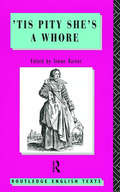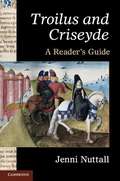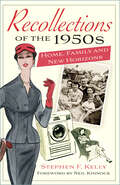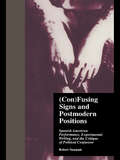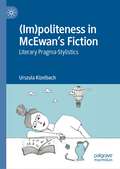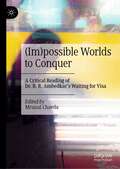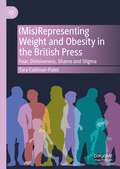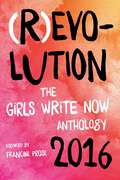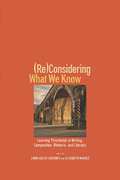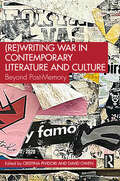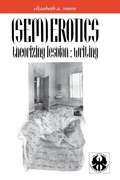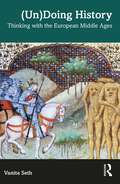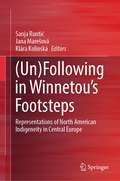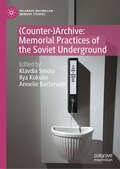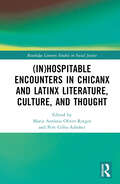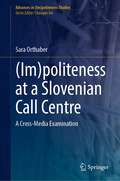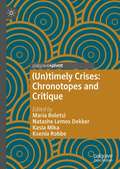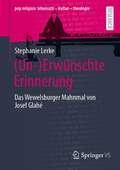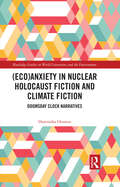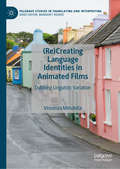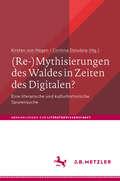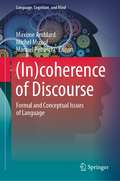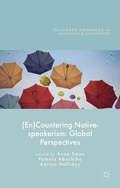- Table View
- List View
'Tis Pity She's A Whore: John Ford (Routledge English Texts)
by John FordThe last decade has seen a revival of interest in John Ford and especially 'Tis Pity She's a Whore, his tragedy of religious scepticism, incestuous love, and revenge. This text in particular has provided a focus for scholarship as well as being the subject of a number of major theatrical productions. Simon Barker guides the reader through the full range of previous interpretations of the play; moving from an overview of traditional readings he goes on to enlarge upon new questions that have arisen as a consequence of critical and cultural theory.
'Troilus and Criseyde'
by Jenni Nuttall'Troilus and Criseyde', Geoffrey Chaucer's most substantial completed work, is a long historical romance; its famous tale of love and betrayal in the Trojan War later inspired William Shakespeare. This reader's guide, written specifically for students of medieval literature, provides a scene-by-scene paraphrase and commentary on the whole text. Each section explains matters of meaning, interpretation, plot structure and character development, the role of the first-person narrating voice, Chaucer's use of his source materials and elements of the poem's style. Brief and accessible discussions of key themes and sources (for example the art of love, the holy bond of things, Fortune and Thebes) are provided in separate textboxes. An ideal starting point for studying the text, this book helps students through the initial language barrier and allows readers to enjoy and understand this medieval masterpiece.
'You've Never Had It So Good!': Memories and Recollections of Life in the 1950s
by Stephen F Kelly Neil KinnockThe 1950s saw a major shift in the lifestyles of many in Britain. The austerity that had dogged the 1940s after the end of the Second World War began to give way to better times. Employment levels rose to new heights, white consumer goods appeared in shop windows for the first time, television replaced the radio in most homes, rock and roll was born, the National Health Service provided free health care to the nation, more children went to grammar schools, leisure time increased, families went on holiday, and the new Queen was crowned — bringing in a glorious new Elizabethan age.Including interviews with former Labour leader Lord Neil Kinnock, footballers Bobby Charlton, Wilf McGuinness and Terry Venables, radio producer, author and journalist Clare Jenkins, and the eminent historian Lord Peter Hennessy, among others, this delightful compendium of reminiscences will appeal to all who grew up in this post-war decade, whether in town or country, wealth or poverty. With chapters on schooldays, TV and radio, trips to the seaside, music and fashion, these wonderful stories are sure to jog the memories of all who remember this exciting era.
(Con)Fusing Signs and Postmodern Positions: Spanish American Performance, Experimental Writing, and the Critique of Political Confusion
by Robert NeustadtFirst Published in 1999. Routledge is an imprint of Taylor & Francis, an informa company.
(Im)politeness in McEwan’s Fiction: Literary Pragma-Stylistics
by Urszula KizelbachThis book is a pragma-stylistic study of Ian McEwan’s fiction, providing a qualitative analysis of his selected novels using (im)politeness theory. (Im)politeness is investigated on two levels of analysis: the level of the plot and the story world (intradiegetic level) and the level of the communication between the implied author and implied reader in fiction (extradiegetic level). The pragmatic theory of (im)politeness serves the aim of internal characterisation and helps readers to better understand and explain the characters’ motivations and actions, based on the stylistic analysis of their speech and thoughts and point of view. More importantly, the book introduces the notion of “the impoliteness of the literary fiction” – a state of affairs where the implied author (or narrator) expresses their impolite beliefs to the reader through the text, which has face-threatening consequences for the audience, e.g. moral shock or disgust, dissociation from the protagonist, feeling hurt or ‘put out’. Extradiegetic impoliteness, one of the key characteristics of McEwan’s fiction, offers an alternative to the literary concept of “a secret communion of the author and reader” (Booth 1961), describing an ideal connection, or good rapport, between these two participants of fictional communication. This book aims to unite literary scholars and linguists in the debate on the benefits of combining pragmatics and stylistics in literary analysis, and it will be of interest to a wide audience in both fields.
(Im)possible Worlds to Conquer: A Critical Reading of Dr. B. R. Ambedkar’s Waiting for Visa
by Mrunal ChavdaWith multidisciplinary examination, this book explores Waiting for Visa, Ambedkar's autobiographical writing. This investigation ranges from Dalit Studies to Discourse analysis. It aims to provide the reader with in-depth knowledge of Ambedkar's unexplored autobiographical memoir and supplement a range of generalized works. The issues addressed in this book are essential to Ethnic and Race studies in general, to which Dalit Studies is but one contributing discipline. The Dalit Studies already have many texts. These texts are primarily concerned with Dalit identity politics, socio-mythological explorations, and Ambedkarian thoughts on economics, politics, and racial-religious discriminations. These are not discussed with Ambedkar's life stories narrated by himself. This book bridges the gap between Dalit Studies and Ambedkar Studies to project how Ambedkar attempted to forge into an impregnable South Asian social, educational, and political fabric. This reference book aims to attract academics and students of Asian, South Asian, and Dalit Studies. The book appeals to educators, policymakers, and comparative literary scholars.
(Mis)Representing Weight and Obesity in the British Press: Fear, Divisiveness, Shame and Stigma
by Tara Coltman-PatelThis book is a linguistic analysis of the British obesity media narrative, analysing a large corpus of published newspaper articles to demonstrate how the language used perpetuates common misconceptions and stereotypes about weight and obesity, and then exploring the sociological effects of these widespread conceptualisations. Weight stigma and weight bias are misunderstood issues, and often underestimated in terms of their prevalence and effect by society at large. The author examines topics including the role of power and persuasion, the use of metaphor, the personal stories of members of the general public, and the gendered real-life consequences of arbitrary weight standards to provide a linguistic driven study of obesity in news media. Obesity is an issue which sits at the intersection of science and the humanities, and as such, although the research methods used are firmly situated within the field of Linguistics, this book will also be of interest to readers from fields as diverse as Sociology, Fat Studies, Media Studies, Medicine and Psychology.
(R)evolution: The Girls Write Now 2016 Anthology
by Girls Write NowFrom one of top after-school programs in the nation, Girls Write Now, comes the next installment in the organization&’s award-winning anthology series: a stunning collection of poetry and prose written by young women and their mentors in exploration of the theme of &“Revolution.&” Distinguished twice by the White House as one of the nation&’s best after-school arts and cultural organizations, and recently honored by Newsweek in an article on after-school programs that make a difference, Girls Write Now works to empower underserved teen girls in New York City by pairing them with professional women writers who serve as their personal mentors. (R)evolution showcases the best poetry, prose, and essays from the mentees and mentors of Girls Write Now on the theme of &“Revolution,&” and includes a bonus section of writing exercises and prompts for individuals and groups. Powerful and inspiring, (R)evolution showcases the brave new voices that are changing the world of literature, one girl at a time.
(Re)Considering What We Know: Learning Thresholds in Writing, Composition, Rhetoric, and Literacy
by Elizabeth Wardle Linda Adler-KassnerNaming What We Know: Threshold Concepts of Writing Studies, published in 2015, contributed to a discussion about the relevance of identifying key concepts and ideas of writing studies. (Re)Considering What We Know continues that conversation while simultaneously raising questions about the ideas around threshold concepts. Contributions introduce new concepts, investigate threshold concepts as a framework, and explore their use within and beyond writing. Part 1 raises questions about the ideologies of consensus that are associated with naming threshold concepts of a discipline. Contributions challenge the idea of consensus and seek to expand both the threshold concepts framework and the concepts themselves. Part 2 focuses on threshold concepts in action and practice, demonstrating the innovative ways threshold concepts and a threshold concepts framework have been used in writing courses and programs. Part 3 shows how a threshold concepts framework can help us engage in conversations beyond writing studies. (Re)Considering What We Know raises new questions and offers new ideas that can help to advance the discussion and use of threshold concepts in the field of writing studies. It will be of great interest to scholars and graduate students in writing studies, especially those who have previously engaged with Naming What We Know. Contributors: Marianne Ahokas, Jonathan Alexander, Chris M. Anson, Ian G. Anson, Sarah Ben-Zvi, Jami Blaauw-Hara, Mark Blaauw-Hara, Maggie Black, Dominic Borowiak, Chris Castillo, Chen Chen, Sandra Descourtis, Norbert Elliot, Heidi Estrem, Alison Farrell, Matthew Fogarty, Joanne Baird Giordano, James Hammond, Holly Hassel, Lauren Heap, Jennifer Heinert, Doug Hesse, Jonathan Isaac, Katie Kalish, Páraic Kerrigan, Ann Meejung Kim, Kassia Krzus-Shaw, Saul Lopez, Jennifer Helane Maher, Aishah Mahmood, Aimee Mapes, Kerry Marsden, Susan Miller-Cochran, Deborah Mutnick, Rebecca Nowacek, Sarah O’Brien, Ọlá Ọládipọ̀, Peggy O’Neill, Cassandra Phillips, Mya Poe, Patricia Ratanapraphart, Jacqueline Rhodes, Samitha Senanayake, Susan E. Shadle, Dawn Shepherd, Katherine Stein, Patrick Sullivan, Brenna Swift, Carrie Strand Tebeau, Matt Thul, Nikhil Tiwari, Lisa Tremain, Lisa Velarde, Kate Vieira, Gordon Blaine West, Anne-Marie Womack, Kathleen Blake Yancey, Xiaopei Yang, Madylan Yarc
(Re)Writing War in Contemporary Literature and Culture: Beyond Post-Memory
by Cristina Pividori and David Owen(Re)Writing War in Contemporary Literature and Culture: Beyond Post-Memory is an exploration of war narratives through the lens of postmemory, offering a critical re-evaluation of how contemporary literature and cultural products reshape our understanding of past conflicts. This volume presents a rich tapestry of perspectives, drawing from an array of conflicts and incorporating insights from international experts across various disciplines, including contemporary literature, film studies, visual arts, and cultural studies. It critically builds upon and extends Marianne Hirsch's concept of postmemory, engaging with complex themes like the ethical dimensions of war writing, the authenticity of representations, and the creative power of art in reimagining traumatic events. This study not only challenges traditional boundaries in war literature and memory studies but also resonates with contemporary concerns about societal engagement with violent pasts, making it a significant addition to scholarly discourse and essential reading for those interested in the intersection of history, memory, and literature.
(Sem)Erotics: Writing
by Elizabeth MeeseWhat is at stake in the production of experimental texts by lesbian writers? what motivates these writers and characterizes their work? In this work, Elizabeth Meese examines the ways in which the experiences of the text, and the experiences of character, diverge and converge wit the writer's own biography.
(Un)Doing History: Thinking with the European Middle Ages
by Vanita SethAgainst the grain of much contemporary scholarship within medieval studies, this work emphasizes the radical alterity and historical rupture that the Middle Ages represents in European history.Through an engagement with three contentious debates in medieval studies – historiography, race and individuated subjectivity – Vanita Seth’s work employs postcolonial and postmodern theorizing to explore questions of ontology, epistemology, facial privileging, and emotion and identity in the European Middle Ages and early modern period. While the subject matter of this book is historical, the stakes are contemporary and political. Seth’s contention is that it is the very alterity that the medieval represents that enables contemporary scholars and activists to recognize as historical that which is so often posited as ‘natural.’ Writing a history of absence while also engaging radically different ways of being in the world, this book argues, helps to disrupt the self-evident naturalization of the face, to contest knee-jerk celebrations of individuality tethered to the human visage, and to recognize racism not as an age-old nemesis but as a distinctly modern form of organizing power.This work is interdisciplinary, engaging scholarship in science studies, philosophy, feminist theory, anthropology, race studies and literature, and postmodernand postcolonial theory. It presumes no prior specialized knowledge in medieval studies and/or history. This book is an essential reading for scholars and students in the fields of medieval and early modern history, race, historiography, identity and emotion studies.
(Un)Following in Winnetou’s Footsteps: Representations of North American Indigeneity in Central Europe
by Sanja Runtić Jana Marešová Klára KolinskáThis book examines the ways in which North American Indigenous identity has been (re)imagined, represented, and negotiated in German, Croatian, Italian, Polish, and Czech culture. Employing a cross-disciplinary and comparative approach and drawing on a range of media—from literature, comics, and film to photography, painting, and the performative arts—across different historical and cultural backgrounds, it aims to both contribute innovative scholarship on Indigenous studies in Europe and open a new avenue in the field by focusing on Central European settings that have received little or no critical attention to date. The book’s novelty also comes from its focus on the latest developments in the field, including the “Ravensburger/Winnetou controversy,” which swept across Europe in 2022, echoing the 2017 Canadian debate over Indigenous appropriation and free speech. It seeks to provide a sound reference and lay the groundwork for future scholarship by opening up a conversation on how Indigenous identities have been portrayed in Central European literature and media texts. To this end, it not only addresses generalized expectations about North American Indigenous people underlying (Central) European public discourse and imagination but also questions whether and to what extent some of the ingrained stereotypical views and practices, such as hobbyism, have been challenged in the face of Indigenous resurgence, rapidly changing media and information-sharing realities, and global cultural shifts. The closing interview with Métis playwright, actor, and director Bruce Sinclair underscores one of the book’s key goals—to spark an informed cross-cultural dialogue that will reveal the mechanisms of, as well as the contradictions and tensions inherent in, the politics of Indigenous representation in (Central) European cultural industries and encourage (Central) Europeans to confront their own cultural assumptions and attitudes.
(Woman) Writer: Occasions and Opportunities
by Joyce Carol OatesThese are essays on somewhat general subjects such as the creative impulse, what it means to be a woman writer though the imagination is genderless, and the abundance of "wonderlands" in our culture and invigorating re-explorations of individual writers such as Melville, Emily Dickinson, Charlotte Bronte, R. L. Stevenson and Hemingway.
**Missing** (Palgrave Macmillan Memory Studies)
by Klavdia Smola Ilya Kukulin Annelie BachmaierThis book is the first major study exploring archival and memorial practices of the Soviet unofficial culture. The creation of counter-archives was one of the most important forms of cultural resistance in the Soviet Union. Unofficial artists and poets had to reinvent the possibilities of maintaining art and literature that “did not exist”. Against the background of archival theories and memory studies, the volume explores how the culture of the Soviet underground has become one of the most striking cases of scholarly and artistic (self-)archiving, which – although being half-isolated from the outer world – reflected intellectual and artistic trends characteristic of its time. The guiding question of the volume is how Soviet unofficial culture (de)constructed social memory by collecting, archiving and memorizing tabooed culture of the past and present.
**Missing** (Routledge Literary Studies in Social Justice)
by Maria Antònia Oliver-Rotger and Pere Gifra-AdroherThis volume addresses the notion of (in)hospitality in the culture, literature, and thought of Chicanx and Latinx in the United States. It underscores those “stranger others” against whom nativist fear and state violence are directed: undocumented migrants, refugees, and asylum seekers. Critical analyses focus on the topics of immigration and state violence, hospitality in written and visual narratives, and the role of hospitality in the translation of academic and literary works. All essays explore the conditional character of hospitality towards Chicanx and Latinx and its attending myths and discourses. Dwelling on the predicament that individuals and groups face as strangers, unwelcome guests, and unwilling hosts, the essays also explore the ways in which Chicanx and Latinx writers, artists, and filmmakers may or may not challenge the guest-host relationship. The ethical concern that runs through the volume considers material history and the institutional, disciplinary regulation of the uncertainty of hospitality acts as factors determining the narratives about foreign others.
**Missing**: A Cross-Media Examination (Advances in (Im)politeness Studies)
by Sara OrthaberThis volume covers the field of linguistic (im)politeness in a particular mediated, customer-oriented setting. It is the first book to do so across telephone, email and social media. It offers key insights into a unique customer service setting through authentic and spontaneous data analysis. The book looks at how customers and agents of a large public transport company engage in transactional services and impolite behaviour. This text is directed at scholars and practitioners working in communication, business discourse, (socio)pragmatics, interaction studies, and social media interactions. It is also of great value to students in applied linguistics and scholars of Slavic languages, particularly Slovenian. The cross-media study is also of value to public/private institutions to reflect on their work practices, helping them improve existing customer–service provider relationships. The diverse readership and appeal are essential features of this book.Examines mediated institutional talk and impoliteness in the Slovenian languageCovers mediated service interactions, such as requests and complaints across three different mediaProvides in-depth insights into communication within a contemporary business environment
**Missing**: Chronotopes and Critique (Palgrave Studies in Globalization, Culture and Society)
by Maria Boletsi Kasia Mika Ksenia Robbe Natashe Lemos DekkerUn)timely Crises explores how ‘crisis’—as a narrative, concept, grammar, and experience—structures time and space. This collectively written volume extends Bakhtin’s ‘chronotope’ to challenge mobilizations of crisis within neoliberal governmentality. The book explores how contemporary crises can trigger memories and traumas of earlier events as well as foster practices of resistance and alternative visions of the future. Drawing from across disciplines and geographical contexts, (Un)timely Crises reimagines the relation of ‘crisis’ with ‘critique’, proposing future trajectories for thinking and living in and through crisis.
**Missing**: Das Wewelsburger Mahnmal von Josef Glahé (pop.religion: lebensstil – kultur – theologie)
by Stephanie LerkeAngesichts des Verstummens von Zeitzeug:innen und des Wiedererstarkens fremdenfeindlicher Motive und Mechanismen wie Antisemitismus, Rassismus und Rechtspopulismus ist Erinnerung an den Holocaust aktueller denn je. Gedenkstätten wie die „Erinnerungs- und Gedenkstätte Wewelsburg 1933 – 1945“ nahe Paderborn stellen in der gesellschaftlichen Erinnerungskultur als bildungspolitische Orte zur Erinnerung an die Opfer des Nationalsozialismus und der Mahnung an die leidvollen Ereignisse unter der nationalsozialistischen Diktatur eine notwendige Möglichkeit hierfür dar. Um sich mit dieser politisch sensiblen Geschichte und ihren aktuellen Erscheinungsformen auseinanderzusetzen, bedient sich die Wewelsburg des Ausdrucksmittels Kunst. Als erste umfassende interdisziplinäre Grundlagenforschung befasst sich dieses Buch mit jenem einzigartigen Stück bundesdeutscher Kunstgeschichte nach 1945, einer bildgewordenen, (un-)erwünschten Erinnerung aus einer theologischen Perspektive. Stephanie Lerke zeigt auf, dass das nachkriegsexpressionistische Wewelsburger Mahnmal von Josef Glahé den Betrachtenden durch sein breites Bildprogramm ein komplexes Themenfeld von historischen und theologischen Inhalten mit aktueller, erinnerungspolitischer Relevanz eröffnet. Sie verdeutlicht, wie dieses „zeitlose“ Medium mit seiner Fülle an Interpretationsspielräumen und Gegenwartsbezügen zur individuellen Spurensuche und Auseinandersetzung mit lebendiger Geschichte einlädt.
**Missing**: Doomsday Clock Narratives (Routledge Studies in World Literatures and the Environment)
by Dominika Oramus(Eco)Anxiety in Nuclear Holocaust Fiction and Climate Fiction: Doomsday Clock Narratives demonstrates that disaster fiction—nuclear holocaust and climate change alike—allows us to unearth and anatomize contemporary psychodynamics, and enables us to identify pre-traumatic stress as the common denominator of seemingly unrelated types of texts. These Doomsday Clock Narratives argue that earth’s demise is soon and certain. They are set after some catastrophe and depict people waiting for an even worse catastrophe to come. References to geology are particularly important—in descriptions of the landscape, the emphasis falls on waste and industrial bric-a-brac, which is seen through the eyes of a future, post-human archaeologist. Their protagonists have the uncanny feeling that the countdown has already started, and they are coping with both traumatic memories and pre-traumatic stress. Readings of novels by Walter M. Miller, Nevil Shute, John Christopher, J.G. Ballard, George Turner, Paolo Bacigalupi, Maggie Gee, Ruth Ozeki and Yoko Tawada demonstrate that the authors are both indebted to a century-old tradition and inventively looking for new ways of expressing the Pre-TSS common in contemporary society. This book is written for an academic audience (postgraduates, researchers and academics) specializing in British Literature, American Literature, and Science Fiction Studies.
**Missing**: Doomsday Clock Narratives (Routledge Studies in World Literatures and the Environment)
by Dominika Oramus(Eco)Anxiety in Nuclear Holocaust Fiction and Climate Fiction: Doomsday Clock Narratives demonstrates that disaster fiction— nuclear holocaust and climate change alike— allows us to unearth and anatomise contemporary psychodynamics and enables us to identify pretraumatic stress as the common denominator of seemingly unrelated types of texts. These Doomsday Clock Narratives argue that earth’s demise is soon and certain. They are set after some catastrophe and depict people waiting for an even worse catastrophe to come. References to geology are particularly important— in descriptions of the landscape, the emphasis falls on waste and industrial bric- a- brac, which is seen through the eyes of a future, posthuman archaeologist. Their protagonists have the uncanny feeling that the countdown has already started, and they are coping with both traumatic memories and pretraumatic stress. Readings of novels by Walter M. Miller, Nevil Shute, John Christopher, J. G. Ballard, George Turner, Maggie Gee, Paolo Bacigalupi, Ruth Ozeki, and Yoko Tawada demonstrate that the authors are both indebted to a century- old tradition and inventively looking for new ways of expressing the pretraumatic stress syndrome common in contemporary society. This book is written for an academic audience (postgraduates, researchers, and academics) specialising in British Literature, American Literature, and Science Fiction Studies.
**Missing**: Dubbing Linguistic Variation (Palgrave Studies in Translating and Interpreting)
by Vincenza MinutellaThis book describes the dubbing process of English-language animated films produced by US companies in the 21st century, exploring how linguistic variation and multilingualism are used to create characters and identities and examining how Italian dubbing professionals deal with this linguistic characterisation. The analysis carried out relies on a diverse range of research tools: text analysis, corpus study and personal communications with dubbing practitioners. The book describes the dubbing workflow and dubbing strategies in Italy and seeks to identify recurrent patterns and therefore norms, as well as stereotypes or creativity in the way multilingualism and linguistic variation are tackled. It will be of interest to students and scholars of translation, linguistic variation, film and media.
**Missing**: Eine literarische und kulturhistorische Spurensuche (Abhandlungen zur Literaturwissenschaft)
by Corinna Dziudzia Kirsten Von HagenAktuell ist Wald in öffentlichen Diskursen zentral, verbunden mit einer Re-Mythisierung, die zum einen als Effekt einer ökologisch bedingten Krise und zum anderen als Folge einer Primordialität des Digitalen zu lesen ist. Wald ist Anti-Digitalität, weil umfassend sinnlich erfahrbar. Umso mehr sich gerade das Buch in seiner Materialität vom Wald als rohstoffliefernder Grundlage entfernt, wird der Wald Thema in Ecocriticism, Kulturökologie und Nature Writing. Doch der Wald hat immer schon zahlreiche Mythisierungen erfahren, als Schutz- und Inspirationsort ebenso wie als Denkfigur lassen sich zahlreiche Inszenierungsformen beobachten, die von Dante bis zu aktuellen Serien, Filmen und Comics führen. In den nun versammelten Beiträgen einer neuen nachhaltigen Form von Online-Studientagen wird der Ubiquität des Waldes aus einer interdisziplinären Perspektive nachgespürt.
**Missing**: Formal and Conceptual Issues of Language (Language, Cognition, and Mind #10)
by Manuel Rebuschi Michel Musiol Maxime AmblardThis present book explores recent advances in modeling discourse processes, in particular, new approaches aimed at understanding pathological language behavior specific to schizophrenia. The contributors examine the modeling paradigm of formal semantics, which falls within the scope of both linguistics and logic while providing overlapping links with other fields such as philosophy of language and cognitive psychology. This book is based on results presented during the series of workshops on (In)Coherence and Discourse organized by SLAM (Schizophrenia and Language: Analysis and Modeling), a project developed to systemize the study of pathological language processing by taking an overarching interdisciplinary approach combining psychology, linguistics, computer science and philosophy. The principle focus is on conversations produced by people with psychiatric disorders such as schizophrenia and autism. The contributions come from young and experienced researchers, and invited speakers. The book appeals to likeminded students and researchers.
**Missing**: Global Perspectives (Palgrave Advances in Language and Linguistics)
by Adrian Holliday Anne Swan Pamela AboshihaThe book addresses the issue of native-speakerism, an ideology based on the assumption that 'native speakers' of English have a special claim to the language itself, through critical qualitative studies of the lived experiences of practising teachers and students in a range of scenarios.
